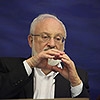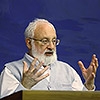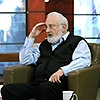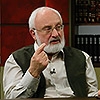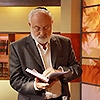JPost: “Things That You’re Liable To Read In The Torah – They Ain’t Necessarily So“
The Jerusalem Post published my new article “Things That You’re Liable To Read In The Torah – They Ain’t Necessarily So“
Nothing is more valuable than the Torah. Why then have we forgotten that the Torah has nothing to do with meaningless words in printed books, and everything to do with unity?
“It ain’t necessarily so,” sang Sportin’ Life in the opera Porgy and Bess, and added, “The things that you’re liable to read in the Bible—it ain’t necessarily so.” This coming Tuesday, we will celebrate Shavuot, the festival of the granting of the Torah. The majority of non-observant Jews know that the festival includes a meal with plenty of sweet dairy foods. The majority of Jews also know that on this day, way back in time, the Torah was given to the people of Israel.
Yet, very few people know what the Torah really is. As a result, very few understand why we celebrate receiving it. Contrary to what most of us have been taught, the Torah is not a set of rules we must observe in order to appease a fearsome God, nor is it a collection of tales that may or may not have happened.
As we will see below, nothing is more pertinent to our lives than the Torah. Nothing can bring us greater benefit than knowing what the Torah is, what it is for, and how we can use it. When we understand this, we will see that Shavuot is not merely a festival, but an extremely important point in our quest for happiness.
The One Condition
In Masechet Shabbat (31a), the Talmud writes that when a convert asked about the meaning of the Torah, Old Hillel told him unambiguously: “That which you hate, do not do unto your friend; this is the whole of the Torah.” Likewise, Rabbi Akiva—whose disciples composed both The Book of Zohar and the Mishnah—said, “Love your neighbor as yourself is the great rule of the Torah” (Jerusalem Talmud, Nedarim, Chapter 9, p 30b).
In order to receive the Torah, Israel united “as one man with one heart” (RASHI—Commentary on Exodus, 19:2) and thereby received a power that elevated them above their egoism and made them love each other as themselves. They did not receive a book. Rather, their unity created the required conditions to be endowed with the power to transcend their selves and unite above their egos, or as King Solomon phrased it in Proverbs (10:12): “Hate stirs strife, and love covers all crimes.”
The book Avnei Miluim (Introduction) writes, “This is what our sages meant when they said, ‘And Israel encamped there before the mount,’ all of them ‘as one man with one heart.’ They wish to say that the entire nation united into one man, after which the Giver was compelled to give them the Torah.”
Throughout the ages, our sages have referred to the transformative power in the Torah as “light.” They stated countless times that the light in the Torah reforms, meaning transforms a person from egoism to love of others. The book Mesilat Yesharim (Chapter 5) writes, “This is the meaning of what our sages said (Midrash Rabbah, Eicha, Preface), ‘I wish they left Me but kept My law (Torah),’ for the light in it reforms it (the evil inclination).” The book Maor Eynaim (Parashat Tzav) writes likewise: “With the Torah, a person can struggle with the evil inclination and subdue it because the light in it reforms it.”
The Babylonian Talmud (Kiddushin 30b) writes that the Creator said, “My sons, I have created the evil inclination, and I have created for it the Torah as a spice.” Similarly, the book Metzudat David (Commentary on Jeremiah, 9:12) explains that Israel lost their land because they fell into the evil inclination once they stopped engaging in the Torah because “the light in it reforms it.” And just so we do not misunderstand the meaning of “evil inclination,” the Holy Shlah writes (In Ten Utterances, “Utterance no. 6”), “The most evil qualities are envy, hatred, greed, and lust, which are the qualities of the evil inclination,” precisely the attributes that constitute our ego.
No Torah Without Unity
When we, the people of Israel, succumbed to the evil inclination and fell into unfounded hatred, we lost far more than the Temple. We lost our ability to use the Torah, the reforming power, in order to rise above our egos. Instead of light, we were left with words whose connection to love of others, mutual responsibility, and unity became hidden from us. In losing that connection, we lost everything that defines Judaism and the people of Israel.
Our ancestors received the reforming light and became a nation only after they pledged to unite “as one man with one heart.” Now, we too must begin to nurture our unity. Precisely because our unfounded hatred is still so profound, we must not wait. Any further delay can cost us heavily in human lives and torments as our world will soon become too immersed in hatred and suspicion to turn back.
Engaging in the Torah does not mean delving into the words of a written book. It means exerting to unite so that our unity covers our hatred, just as we quoted King Solomon above. The book Maor Vashemesh (Parashat Yitro) explains this point with the following words: “Obtainment of the Torah is primarily through unity, as in the verse, ‘And Israel encamped there before the mount,’ ‘as one man with one heart,’ and there their filth (evil inclination) ceased.” In Parashat Emor, the book continues, “During the days of the [omer] count, a person should correct the quality of unity, and by this one is rewarded with obtainment of the Torah on the festival of Shavuot, as it is written, ‘And they journeyed from Refidim and came to the Sinai desert, and Israel encamped there before the mount.’ RASHI interpreted that they were all in one heart as one man and this is why they were rewarded with the Torah.”
The book Likutey Halachot (Assorted Rules) also explains the connection between the Torah and Israel’s unity. In the chapter Hilchot Arev (“Rules of Guarantee”), the book writes, “The root of mutual responsibility extends primarily from the reception of the Torah, when all of Israel were responsible for one another. This is so because at the root, the souls of Israel are regarded as one, for they derive from the origin of the unity. For this reason, all of Israel were responsible for one another upon the reception of the Torah,” namely the reception of the reforming light.
In the chapter Hoshen Mishpat, the book Likutey Halachot emphasizes the connection between the Torah and mutual responsibility: “It is impossible to observe Torah and Mitzvot (commandments),” meaning receive the light that transforms egoism into love of others, “unless through mutual responsibility, when each one is responsible for his friend. For this reason, each one should include himself with the whole of Israel in great unity. Hence, at the time of the reception of the Torah, they immediately became responsible for one another, for as soon as they want to receive the Torah they must merge as one in order to be included in the desire. …Thus, specifically by each being responsible for his friend, they can observe the Torah. Without this, it would have been impossible to receive the Torah whatsoever.”
If We Want to Survive
Today, in the turbulent reality that is our lives, engaging in Torah—meaning nurturing our unity—is not only our key to success; it is the key to our survival as individuals, as Jews, and as a sovereign nation.
Shavuot, the festival of the giving of the Torah, reminds us that only if we unite we will succeed. If not, the Talmud warns in two separate places (Shabbat 88a, Avoda Zarah 2b): “There will it be your burial.”
We must not rely on foreign rulers and the trumpets they sound. Our weapon is unique and cannot be taken away. It hurts no one, but it makes us indestructible. Our weapon is the power of our unity, and the festival of the giving of the Torah is approaching at the perfect time to remind us that now we must use our secret power—the reforming light—that abides in our unity, which is our law, our Torah.
[207551]



